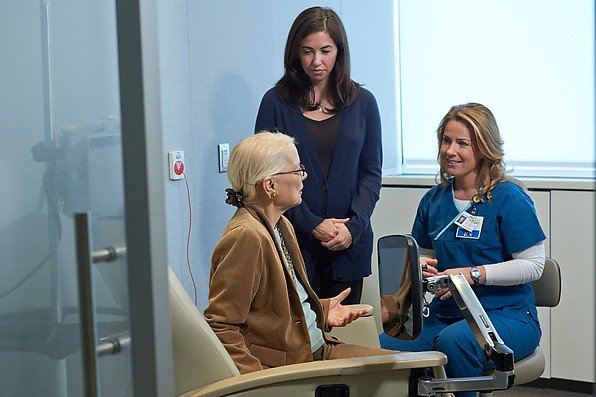
The private chemotherapy suites at MSK Westchester in West Harrison offer wooded views as well as lighting and temperature control.
Depending on what type of chemotherapy you’re receiving, where you live, and other variables, you may have your treatment at home, at your doctor’s office, in the hospital, or at one of our various outpatient clinics. We recognize that your life is busy and that it may be stressful to fit chemotherapy sessions into your schedule. To help make things a little easier, we offer chemotherapy at our outpatient treatment facilities in:
- New York City
- Long Island
- Westchester County
- New Jersey
Expert, Compassionate Care
Medical oncologists are doctors who specialize in treating cancer with medicines such as standard chemotherapy drugs, targeted therapies, and immune therapies. Because our medical oncologists are focused specifically on cancer, they are experienced in knowing exactly which drugs to recommend, when to use them, and how much to give as part of a customized treatment plan that will lead to the best possible outcome for you.
Our nurses are at the heart of your treatment experience, whether you’re being treated in the hospital or as an outpatient. Like the doctors they partner with, they provide extraordinary experience and compassionate, expert care. Our nurses place your needs and preferences first while providing a range of services, including administering your chemotherapy, assessing and managing your side effects, educating you and your family and caregivers about what to expect during treatment, and offering emotional support.
Chemotherapy and Your Treatment Plan
Your medical oncologist will create a treatment plan for you by selecting one or more systemic (whole-body) therapies from among the more than 100 options currently in use.
At Memorial Sloan Kettering, we personalize your treatment plan to your specific situation: the type of cancer you have, how advanced it is, your age and the overall condition of your health, and other medical conditions you may have, such as diabetes or heart disease. Also important to consider are:
- the size of your tumor
- where the tumor is located
- whether the tumor has metastasized (spread) to other parts of the body
- whether you’ve had cancer or chemotherapy before
While chemotherapy and other systemic therapies can be effective when used alone for certain cancers, we often recommend these drugs in combination with other treatments such as surgery or radiation therapy. In whatever ways we integrate chemotherapy into your care, we’ll consider all the latest and most cutting-edge options available, explain our recommendations, and answer any questions you may have.
Receiving chemotherapy can be draining as well as time consuming, so we aim to create a regimen or schedule that works for you. Your treatment regimen — how frequently and for how long you receive chemotherapy — is shaped by such factors as the type of cancer you have, how advanced it is, which medicines you receive, and how your body reacts to them.
Depending on your situation, we may recommend cycles of chemotherapy that involve periods of treatment followed by periods of rest to let your body recover.
New Cancer Treatments and Clinical Trials
A clinical trial is a type of research study that tests a new medical approach in people to make sure it’s safe and effective. Clinical trials have played an important role in the fight against cancer. These studies are the only scientific way to prove whether a new treatment works better than current treatments. Most of the approaches that doctors use to treat cancer today would never have become available without clinical trials.
Our medical oncologists are leaders in developing new treatments that are more effective than standard therapies, and often safer. Our experts are also researching new ways to deliver chemotherapy.
For example, as we’ve learned more about the genetics of various cancers, we and others have developed new drugs to target specific genetic changes inside cancer cells. Patients who are treated with this approach, called targeted therapy, may experience fewer or different side effects than they would with standard chemotherapy.
MSK researchers have also played a leading role in pioneering immunotherapy, a treatment approach that harnesses the body’s immune system to treat certain types of cancer.
While some of these new treatments are now approved and part of the standard of care for some cancers, many are being evaluated in clinical trials in which they are used alone or in combination with other therapies. Your doctor may propose such a treatment, or you may wish to ask about whether participating in a clinical trial may be appropriate for you.



